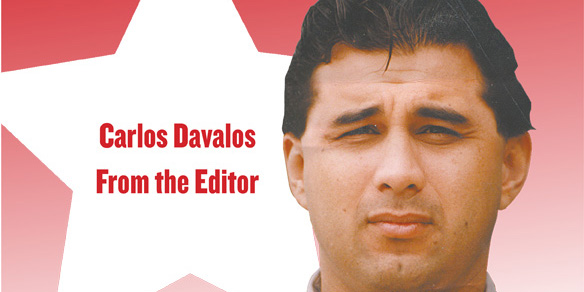If you can’t say something nice about someone, at least be witty
We often read about individuals who utter some word or phrase, so profound that it leaves a lasting impression on many.
We read it and say to ourselves, “Did he really say that or did some press agent make it up?” An example of this is the famous uttering by Gen. MacArthur near the end of the war as he waded ashore at Leyte, “I have returned.”
There are some who doubt this, saying that some newsman made it up to lend a bit of drama to the occasion. Since there is no concrete evidence in either direction we accept it as gospel and perhaps conjure some lasting statement that we might make up on a moment’s notice.
Reader John Porner has sent me a list of such statements made by famous folks but they are of the insulting genre.
The unknown author of the piece has labeled them as “classy insults,” that is, used without borrowing from present day lexicon. He states that these glorious insults are from an era before the English language got boiled down to 4-letter words. There, for example, is one that a member of Parliament once said to the British Prime Minister Disraeli, “Sir, you will either die on the gallows or of some unspeakable disease.” To which Disraeli replied, “That depends, Sir, whether I embrace your policies or your mistress.”
Now, how is that for a repartee? Of course, that could apply in any age.
Then there are the one-liners: Walter Kerr saying, “He had delusions of adequacy.” And the master, Winston Churchill, “He has all the virtues I dislike and none of the vices I admire.”
I once had many of the sayings attributed to Churchill but I seemed to have misplaced the document. I do remember one. One Lady Anne, at a party, said to Churchill, “Winston, if you were my husband I would put a little arsenic in your coffee each morning.” And Winston replied, “Anne, if I were your husband I would drink it.”
Americans were also experts at the classy insults. Clarence Darrow is credited with saying, “I have never killed a man, but I have read many obituaries with great pleasure.”
And there is writer about writer, William Faulkner speaking about Ernest Hemingway, “He has never been known to use a word that might send a reader to the dictionary ”
Moses Hadas once said, “Thank you for sending me a copy of your book. I’ll waste no time reading it.” I have one example of Mark Twain but I am sure there are many, “I did not attend the funeral, but I sent a nice letter saying I approved of it.” Then there is another American, Oscar Wilde, with his, “He has no enemies, but is intensely disliked by his friends.”
Back to Winston, he had many a repartee with George Bernard Shaw. Shaw once sent him a letter stating the following, “I am enclosing two tickets to the first night of my new play; bring a friend, if you have one.” Winston’s reply, “Cannot possibly attend first night, will attend second…if there is one.”
Stephen Bishop speaking to someone, “I feel so miserable without you; it’s almost like having you here.” And John Bright’s observation, “He is a self-made man and worships his creator.”
Irvin S. Cobb once wrote, “I’ve just learned of his illness. Let’s hope it’s nothing trivial.” Talleyrand once said, “In order to avoid being called a flirt she always yielded easily.” And the actor, Forrest Tucker, “He loves nature, in spite of what it did to him.”
I think one could write a full book about Mae West put downs. “His mother should have thrown him away and kept the stork.” Also, Groucho Marx: “I’ve had a perfectly wonderful evening. But this wasn’t it.” Or Billy Wilder, “He had Van Gogh’s ear for music.”
And a final Oscar Wilde that might apply to me, “Some cause happiness wherever they go; others whenever they go.”














